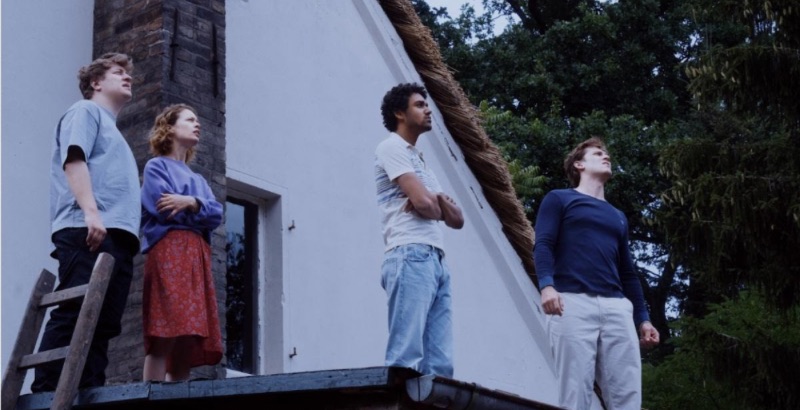
The world is burning, animals being caught up in man-made flames as ash ruins a night of wining and dining, and still, our protagonist is most caught up in his ego and inability to see beyond his own narcissistic-driven insecurities. Directed by Christian Petzold, Afire conjures up the worst type of person in the world and somehow, throughout the runtime of the film, manages to make him even more insufferable as the mounting threats of forest fires loom heavily over an idyllic coastal village.
Leon (Thomas Schubert) is traveling on holiday with his friend, Felix (Langston Uibel) to the latter’s family home by the Baltic Sea. Their diametrically opposed personalities set the tone for the film. Both have escaped the bustle of Berlin in order to work on their individual creative pursuits: Leon’s working on his second manuscript, Felix on an application portfolio for art school. While Felix embraces the natural world around him, engaging with it and those who inhabit it with commendable, confident, ease, Leon uses deadlines as a crutch to dodge any sort of socializing. Felix is able to glean inspiration from his surroundings, effortlessly meeting new people and becoming friendly with the woman, Nadja (Paula Beer) who is sleeping in the other room of the cottage, while Leon becomes resentful of anyone in his presence.
Every question Leon asks is loaded with unspoken but hardly hidden disdain and judgment. He can’t take criticism but is eager to dole it out, burdened by his own internalized hatred that’s drowned out by his entitlement. Everyone is out to get him and when Felix and Nadja are praised for their own artistic pursuits, he seethes with jealousy. Schubert is excellent in embodying such an unlikable character, his face contorted in a perpetual scowl, watching from afar as others succeed in ways he wishes to, though he’d never admit to it.
The group of performers and escalating tensions would’ve been enough for certain directors, but Petzold has always sought to infuse the surreal or supernatural into his storytelling. With the addition of Enno Trebs as Devid, and Matthias Brandt as Leon’s publisher Helmut, the cottage by the sea becomes packed while Leon’s isolation grows more pronounced, his bitterness venomous. That this mounting, figurative claustrophobia mirrors the ongoing forest fires that press inwards towards their home puts almost too fine a point on Leon’s ongoing, self-made struggle. Petzold’s script forgoes any semblance of overt subtlety from the jump, however, with the opening moments seeing Leon and Felix’s car breaking down, and Leon then momentarily getting lost in the woods. The message is clear: this is a doomed trip.

However, what the script does expertly is burying just how tragic and catastrophic the story will become over the course of the film, allowing us and the characters to feel adrift in time. Petzold’s direction with the cinematography by Hans Fromm creates a sense of deep, running unease in moments where we see the forest fires at different stages. Formidable and unyielding to the might of man, impossibly deadly, Fromm captures their natural, devastating beauty and he and Petzold are able to create an atmosphere through the visuals that make for magical realism. The story is anchored in the very real pain and problems caused by a deeply, unbearably human protagonist. He and the fires share one thing in common: neither will stop for the other.
Afire creates a purgatory setting where we’re unsure of who is the main punisher. As presented through Leon’s point of view, one might expect that this Baltic Sea retreat is his version of hell, the flames of it quite literally lapping at his heels. But then we take in Felix’s aversion to him, the increasing frustration Nadja experiences in his presence and the way everyone has a tendency to reach out and back away as if being burned by Leon’s bite, their inability to fully escape in, and wonder if they’re truly the ones suffering. The ending itself is rushed but it bruises and calls to question who everyone was to one another. Despite us knowing from the start that Leon is unlikable, the ending still makes us question if, even with that knowledge, we were led astray by an unreliable narrator.
Often hilarious with a wicked sense of humor, Afire crafts tension despite the initial, tranquil. With a trio of terrific performances from Schubert, Uibel, and Beer, the film might not be Petzold’s finest, but it displays his continual gravitation towards stories of those caught in unmoving, transitional stasis of being. Emboldened with unlikely elements and particular personalities that bristle and interrogate our lesser qualities, the film directs the human condition while shooting the landscapes to best capture the impenetrable forces of nature of fire and sea. Afire questions the damage wrought by self-importance and blind ego with wit and visual wonder.
Afire is out now.
Afire
-
Rating - 7.5/107.5/10
TL;DR
Often hilarious with a wicked sense of humor, Afire crafts tension despite the initial, tranquil. With a trio of terrific performances from Schubert, Uibel, and Beer, the film might not be Petzold’s finest, but it displays his continual gravitation towards stories of those caught in unmoving, transitional stasis of being.






